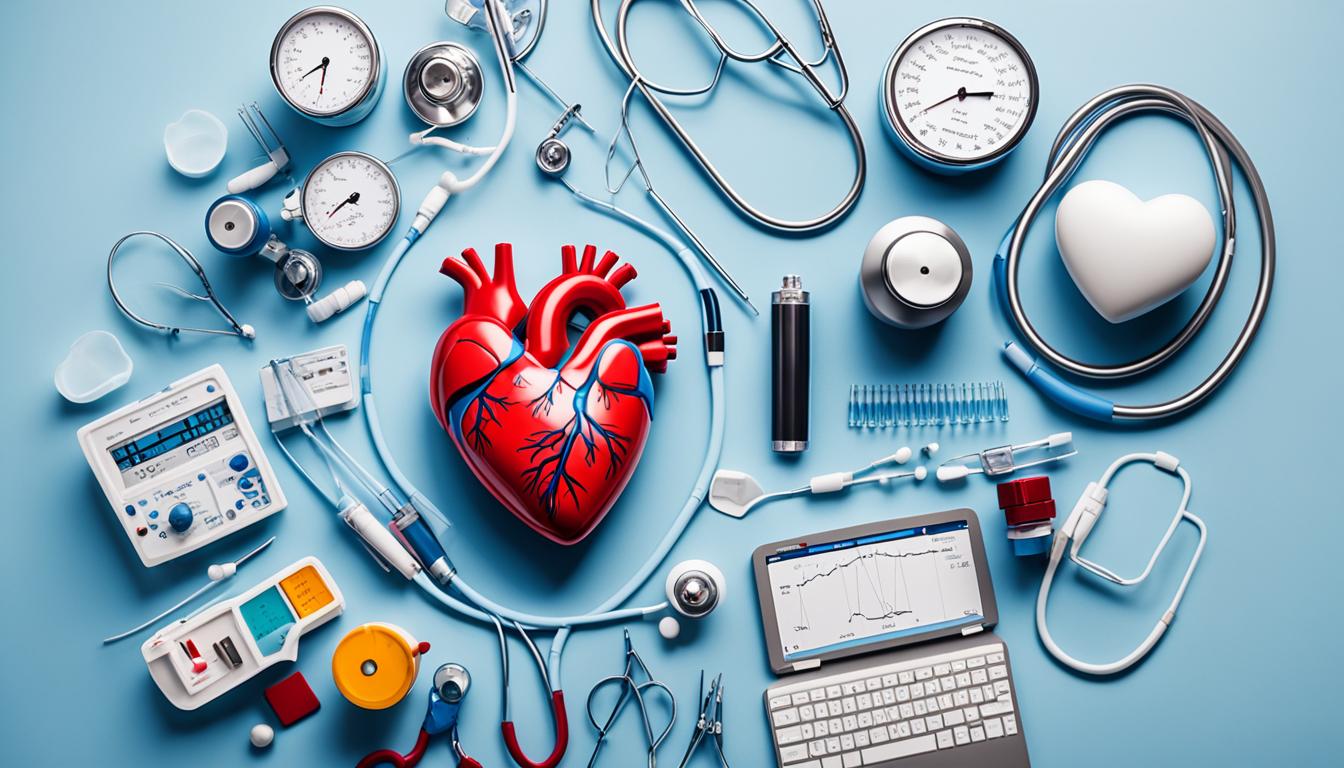Bradycardia is a heart rhythm disorder marked by a slow heart rate, usually less than 60 beats per minute. It’s also known as a slow heart rate or bradyarrhythmia. The cause can be other health issues like heart disease or an underactive thyroid.
Those with bradycardia might feel dizzy, have trouble breathing, and feel fatigued. They might also get chest pains or feel confused. These signs happen because the body doesn’t get enough blood and oxygen.
To find out if someone has bradycardia, doctors look at their health history and do a physical exam. They might also use blood tests and an electrocardiogram (ECG). An ECG checks the heart’s electrical system.
The way to treat bradycardia changes depending on what’s causing it and how bad the symptoms are. Doctors might give medicines to help the heart beat normally. If the problem is serious, a pacemaker can be put in. This helps the heart pump at the right rate.
New treatments like stem cell therapy show hope for those with bradycardia. This method uses stem cells to help the heart grow new, healthy tissue. That can make the heart beat properly again.
Key Takeaways:
- Bradycardia is a heart rhythm disorder characterized by a slow heart rate.
- It can be caused by other health issues like heart disease or an underactive thyroid.
- Signs of bradycardia include dizziness, trouble breathing, fatigue, chest pains, and confusion.
- The condition is diagnosed through a review of health history, a physical exam, and tests such as an ECG.
- Treatments include medication, pacemakers, and the new approach of stem cell therapy.
Causes of Bradycardia and Risk Factors
Bradycardia is having a heart rate that’s too slow. This can result from several causes. Knowing these reasons is important for correct diagnosis and treatment. Common causes include:
- Abnormal Conduction of Electrical Impulses: Issues in the heart’s electrical system can make it beat slowly. Sometimes, the heart won’t beat at the right pace.
- Myocardial Infarction: A heart attack can damage the heart, causing it to beat slower. The injury from a heart attack can mess up the heart’s electrical system.
- Hypertension: High blood pressure makes it hard for the heart to pump blood well. The heart then slows down to cope with this pressure.
- Congenital Heart Diseases: Irregularities in the heart’s structure from birth can slow down the heart.
- Medications: Some drugs, like beta-blockers and calcium channel blockers, can also lower the heart rate.
Other health issues can also lead to bradycardia. These include:
- Cardiovascular Disease: Heart problems can make the heart beat too slowly. This happens with conditions like heart failure, making it hard for the heart to keep the right rhythm.
- Hypothyroidism: A thyroid that doesn’t work well can mess up important body hormones. This can slow the heart down.
Certain factors increase the chance of bradycardia. These factors are:
- Age: The older you get, the higher the risk of bradycardia. It’s part of the heart’s natural aging process.
- Medications: Some drugs used for heart issues can also lower heart rate.
- Family History: If heart problems run in your family, you might be more likely to get bradycardia.
Healthcare experts can use this knowledge to address bradycardia. By focusing on causes and risks, they choose the right steps for each patient.
| Causes of Bradycardia | Risk Factors |
|---|---|
| Abnormal Conduction of Electrical Impulses | Age |
| Myocardial Infarction | Medications |
| Hypertension | Family History |
| Congenital Heart Diseases | |
| Medications |
Diagnosis and Treatment of Bradycardia
Diagnosing bradycardia starts with a full physical check-up and pulse checks. Doctors will also use tests like electrocardiograms (ECGs). An ECG shows the heart’s electric activity, helping find rhythm issues. Sometimes, a long-term ECG is needed to spot rare heart events.
How to treat bradycardia depends on why it happens and how bad it is. Doctors might give medicines to fix the heart rate. For more serious cases, a pacemaker might be inserted in surgery. This device keeps the heart beating steady.
Today, stem cell therapy shows promise in helping repair the heart. But, it’s still in early stages of research. Every treatment plan is made to fit the patient’s health history and needs. Talking to a cardiologist is key to getting the right help for bradycardia.

